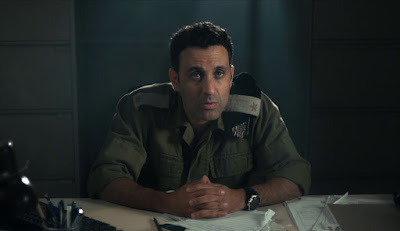The genre we have not seen much of regarding this particular subject is comedy. To which you might immediately respond, "And for good reason, dummy!" Until you've viewed the movie under consideration here, that is.
As written and directed by Sameh Zoabi (shown at right), Tel Aviv on Fire might best be described as shambling -- which is not simply deliberate but a huge part of its charm. The film starts slowly and moves even more so. Yet that quiet, unhurried pace builds continually into something near amazing: funny, feisty, satiric, ironic and quite delightful. At film's end TrustMovies was in a state of sheer joy at its underhanded accomplishment of casting the kind of light on this more than 70-year conflict that both upends it and forces you to view it differently.
One of the small but piquant joys of the film is how this Palestinian soap opera seems different in scale yet all too redolent of soaps around the world. Ditto how love stories resort to such similar schemes to work themselves out. And, yes, how the male ego -- whether Israeli, Palestinian, or any other culture/nation -- proves every bit as tender and typical as you might expect.
The movie may be low-key, but it's an absolute triumph in just about every way -- never more so than when it addresses the Israeli-Palestinian conflict without violence yet head-on, dead-on and with such unalloyed precision and delight.
From the Cohen Media Group, running 97 minutes, in Arabic and Hebrew (with English subtitles for both), Tel Aviv on Fire, after opening on the coasts earlier this month, hits South Florida this Friday, August 23. In Miami, look for it at the Coral Gables Art Cinema, in Hollywood at the Cinema Paradiso, in Fort Lauderdale at the Savor Cinema, in Boca Raton at the Living Room Theaters; and at the Movies of Delray and Movies of Lake Worth. Wherever you live around the USA, to see if the film is playing anywhere near you, click here.


















































